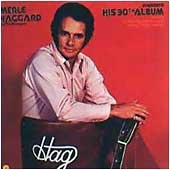Merle Haggard Presents His 30th Album
| Merle Haggard Presents His 30th Album | ||||
|---|---|---|---|---|
 |
||||
| Studio album by Merle Haggard | ||||
| Released | August 1974 | |||
| Recorded | July 1969, July and October 1973, March and April 1974, Columbia Recording Studio, Nashville, TN | |||
| Genre | Country | |||
| Label | Capitol | |||
| Producer | Ken Nelson, Fuzzy Owen | |||
| Merle Haggard chronology | ||||
|
||||
| Professional ratings | |
|---|---|
| Review scores | |
| Source | Rating |
| AllMusic |
|
| Robert Christgau | (B+) |
Merle Haggard Presents His 30th Album is a studio album by American country singer Merle Haggard, released in 1974. Contrary to the album's title, this was his 20th studio album; however, the number 30 includes his collaborative albums, gospel records, live albums, and compilations up to that point.
After only having a hand in writing three songs on his previous album If We Make It Through December, Haggard composed the majority of the tracks on this LP, which became his seventh number one country album. It produced two #1 singles, the melancholy "Things Aren't Funny Anymore" and the rambunctious "Old Man from the Mountain." During a 1999 TNN television special called Merle Haggard: For the Record, country star and Bakersfield sound disciple Dwight Yoakam told the audience at the Las Vegas Hilton that he had been "stopped dead in my tracks" when he heard the destroyed family lament "Holding Things Together," recalling that "it had one verse, and there was nothing left to say after you heard that one verse." Yoakam then performed the verse and later recorded the song itself for his 2003 album In Others' Words.Merle Haggard Presents His 30th Album also includes "The Seashores of Old Mexico," which would become the title track of his second duet LP with Willie Nelson in 1987.
The same year the album came out, Haggard appeared on the cover of TIME magazine.
Mark Deming of AllMusic wrote "If Merle Haggard didn't come up with a masterpiece for his 30th album, you could argue he didn't have to—he made consistently stronger albums than most of his contemporaries in country music, and he was still doing that 30 LPs and nine years into his recording career, and that in itself is a pretty impressive accomplishment." Music critic Robert Christgau wrote "The man has been making them for less than a decade, and thirty is too damn many. But this is clearly where Haggard wants to show off his range, and the display, featuring more original songs than he's put in one place for a long time, is pretty impressive. There's a rip-roaring infidelity lyric that's definitely one of his genius pieces—"Old Man From the Mountain," it's called, complete with bluegrass shading. And though after that only "Honky Tonk Nighttime Man" and the Bob Wills/Lefty Frizzell cover are liable to be remembered, just about everything else is liable to be enjoyed." In his book Merle Haggard: The Running Kind, biographer David Cantwell calls the LP "emblematic" of Haggard's less focused albums in the mid seventies.
...
Wikipedia
